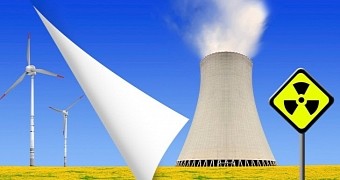This September 15 marks precisely one year since Japan pulled the plug on its last operating commercial nuclear reactor, and Greenpeace was quick to congratulate the country for having managed to go this long without relying on this energy source.
More so since Japan is, for the time being at least, the world's third largest economy, and consequently needs loads of power to keep its numerous industries and businesses up and running.
Why did Japan shut down its nuclear reactors?
For those unaware, this country was left with no choice but to pull the plug on its impressive collection of nuclear reactors, i.e. a total of 48 such energy-generating facilities, in the aftermath of the Fukushima disaster in 2011.
Here's what this incident boiled down to: on March 11, the Fukushima nuclear plant was hit by a tsunami birthed by a magnitude-9 earthquake. As a result, three of its reactors suffered a meltdown.
Following this nuclear catastrophe, some 300,000 people had to be evacuated. It's been years since the meltdown, yet the plant is still leaking radioactive material into its surroundings, and operator Tepco is nowhere near done cleaning up the site.
Given the magnitude of this disaster, it should come as no surprise that, having experienced first-hand what nuclear reactors are capable of when gone haywire, people in Japan lost their trust in this energy source and pressured high officials into shutting down the country's remaining reactors.
One year without any reliance on nuclear power whatsoever
As detailed by Greenpeace, the country began phasing out nuclear power shortly after the Fukushima disaster. However, it was only on September 15, 2013, that the last of Japan's operating reactors was put to sleep for an indefinite period of time.
Despite the fact that, as mentioned, Japan has a flourishing economy and is home to about 130 million people, the country has not experienced any blackouts since the day the last nuclear reactor was shut down until now. On the contrary, it's been doing a wonderful job going by without this energy source.
This is because considerable investments have been made in clean energy sources such as wind and solar, and because people in this country have taken it upon themselves to push for energy efficiency, environmental organization Greenpeace explains.
“Not only were there were no electricity blackouts, but Japan came in second worldwide for installing solar PV in 2013 (only China installed more). This was a massive and rapid expansion,” the group writes on its website.
Furthermore, “The people's dedication to energy efficiency – the cheapest and quickest way to reduce costs and carbon emissions – has led to a reduction in electricity demand equal to 13 nuclear reactors. At the same time, citizens are installing thousands of micro solar PV every month.”
Should Japan restart its nuclear reactors?
The way environmental group sees things, there is no need for Japan to go through the trouble of trying to get its nuclear reactors back online, and not just because the country does not seem to be missing them all that much.
Thus, Greenpeace maintains that, first off, the country's residents still do not trust this energy source. Besides, the organization says that Japan has the potential to have 40% of its electricity needs met by renewables by the year 2020, and therefore has no need for nuclear power.
“The majority of Japanese citizens, when polled, consistently oppose plans to restart the country's nuclear reactors. After all, Japan has functioned perfectly well for an entire year without nuclear electricity. Why risk another disaster with an outdated technology that is not needed?” Greenpeace says.

 14 DAY TRIAL //
14 DAY TRIAL //